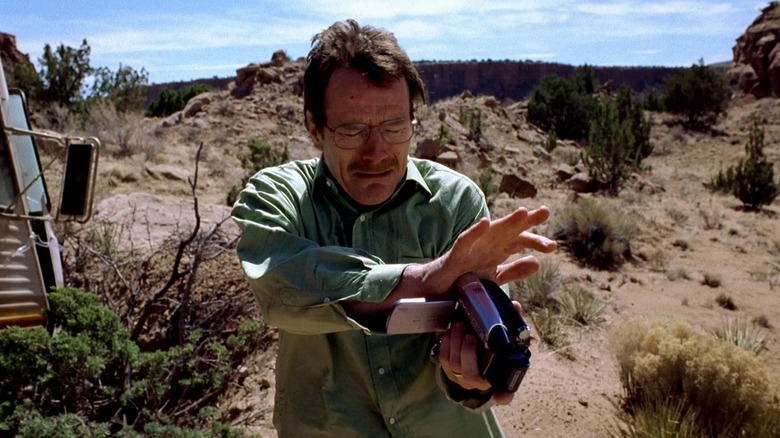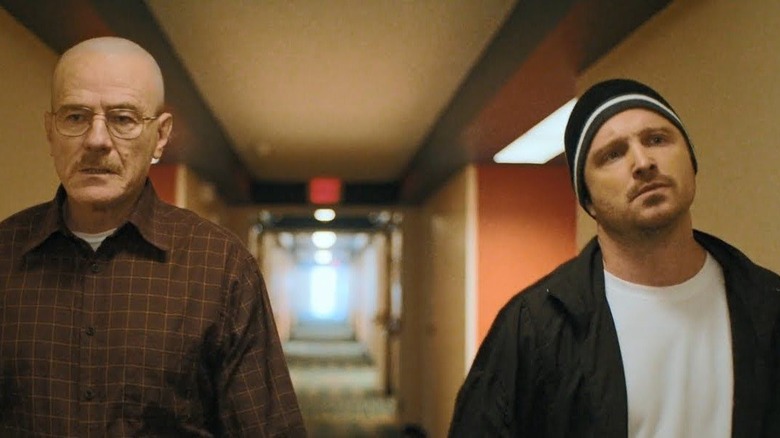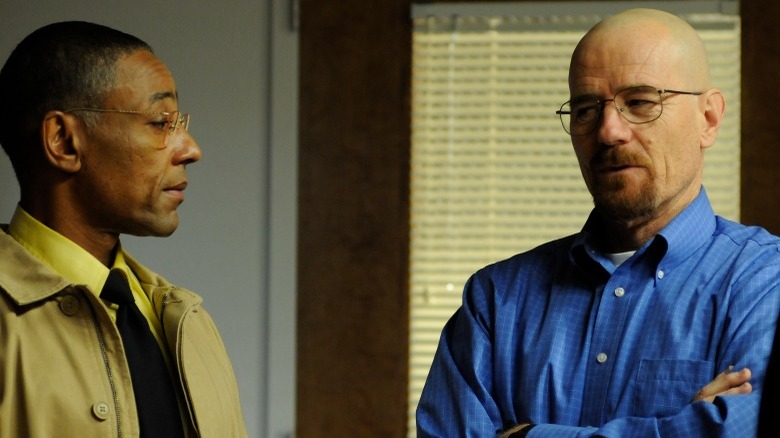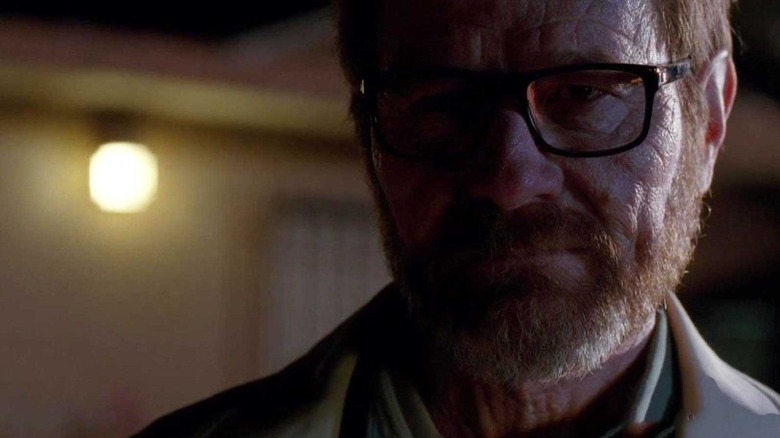Breaking Bad Ending Explained: Guess I Got What I Deserved
"Breaking Bad" didn't become a cultural phenomenon overnight — its fanbase grew dramatically as people discovered it on their own. The scant ratings it had received for its premiere had exploded to 10 million for its finale. The show was addictive and propulsive, amplifying its grim dramatics with innovative photography and narrative time bombs. Mundane moments in the lives of the show's characters could turn to suspense on a dime, with violence emerging suddenly on the lovingly captured New Mexico horizons.
The "breaking bad" of the title is the story of 50-year-old Walter White (Bryan Cranston) as he wrestles with illness, his ego, and Mexican cartels. He enters the show as a meek, put-upon chemistry teacher and exits it as a criminal mastermind fallen from grace, untold amounts of blood on his hands. While the show was thematically rich enough to accommodate analysis, it was funny, preposterous, and exciting too, striking a perfect balance.
Walt had already broken by the show's final season, turning into the monster promised by the show's title. The challenge for the writers was to determine his unraveling.
At the show's outset, Walt is living a careful life, a chemistry teacher and car wash employee, providing for his wife Skyler (Anna Gunn) and son Walt Jr. (R.J. Mitte). He feels devalued and emasculated, which doesn't change when he learns he has lung cancer on his 50th birthday. When his DEA brother-in-law Hank (Dean Norris) takes him on a ride-along meth bust, Walt spots a former student running away — and gets an idea.
Teacher and student
Walt reunites with the student, Jesse Pinkman (Aaron Paul), and decides to put his chemistry knowledge to use. He helps Jesse cook a pure, blue meth and negotiates its sales, adopting the alter ego of "Heisenberg" (after physicist Werner Heisenberg). All Walt needed to jump into the world of crime was something to shake him out of his stultifying middle-class comfort. Beyond the rewards of easy money, Walt also relishes the chance to prove himself as a man using his chemistry skills. Dealing with local kingpin and first major series antagonist Tuco (Raymond Cruz), Walt tosses fulminated mercury to the ground and causes an explosion, giving him a nerdy "badass" moment to differentiate him from Jesse's gangster posturing. Walt's chemistry knowledge is effectively a superpower.
Jesse and Walt's relationship forms the spine of the show, so much so that fans continue to be shocked at the revelation that Jesse was originally set to die in the show's first season, "horribly," as creator Vince Gilligan mentioned some years later.
Throughout the show's run, Walt and Jesse vacillate between being partners and enemies. Walt uses Jesse's addiction history as ammunition in arguments. Meanwhile, Walt's achievements and success insulate him from personal reflection — he spends so much of the show convinced of his own genius that he hardly notices Jesse's growth. When Walt dismisses the well-being of children, Jesse's conscience makes it hard for him to bear his mentor's callousness.
Walt's ascent
Walt and Jesse end up employed in the service of Chilean fried chicken mogul Gus Fring (Giancarlo Esposito), who continues to pit them against each other when he notices Walt's ego is too much to handle. Jesse, smart but damaged, is capable of working on Walt's level, and Gus takes him along to Mexico to deal out his long-gestating desire for vengeance on high-ranking cartel members.
Vince Gilligan saw the show's fourth season as a chess match between Gus and Walt, complete with rapidly moving pieces and turnovers in fortune. Walt convinces Jesse to join him by claiming that Gus has poisoned Jesse's girlfriend's son. Walt "wins," as he tells Skyler, but the season's final shot reveals that he was the one who poisoned the kid. Now that Walt has fully "broken," the stage has been set for his comeuppance, and the final season opens with a mysterious flashforward: a lonely, bearded Walt buying a weapon from a gun dealer.
With Gus killed, Walt has no more obstacles. His cancer is in remission, his wife has been horrified into submission, and he has Jesse on his side. Once he brings slack-jawed, child-shooting sociopath Todd (Jesse Plemons) into his team, he is finally able to grow into a solid kingpin. The fifth season was split into two: the first half shows Walt's final ascent, and the second his unraveling. Todd leads Walt to associate with Todd's neo-Nazi uncle Jack (Michael Bowen), and Hank has finally cottoned on to Walt's crimes.
The satisfying ending
"Our job really is about surprising the audience," noted Vince Gilligan. That directive led to some of the show's bleakest and most emotionally draining moments in its final episodes. Skyler has realized her husband is a monster, and the clash between Hank and Walt results in Hank's murder by neo-Nazis. Jesse, who has finally turned against Walt, is forced by the neo-Nazis into meth cooking servitude. After a brutal fight with Skyler in the family's kitchen, Walt runs off to New Hampshire cabin. Months pass.
The surreal, nightmarish tone shift of these episodes is so pronounced that some people read the finale as Walt's fever dream. When he decides to finally take action and get revenge on the neo-Nazis, he moves discretely through his old haunts, confessing to Skyler that he really did enjoy cooking meth and playing gangster.
The weapon that Walt bought in the season's cold open, a machine gun attached to a turret in his car, gets used on Jack's men. Walt protects Jesse by tackling him to the ground. The two individually kill Jack and Todd, and then share one final, fraught moment before Jesse drives off from the warehouse ecstatically, setting the stage for his follow-up movie, "El Camino." Walt, meanwhile, dies from his wounds as the police arrive to Badfinger's "Baby Blue," a sentimental tribute to the color of Walt's meth.
Vince Gilligan wanted the ending to satisfy the majority of the show's massive fanbase, using the ending of "Casablanca" ending as a blueprint, but it could be argued it's too easy on the show's protagonist, even if it represents the show's pulp qualities at its best. Walt gets everything he wants, including a death that keeps him from ever answering for what he did.



